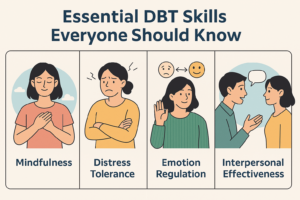🧠 Essential DBT Skills Everyone Should Know
 By Dr. Srinivas Rajkumar T, Consultant Psychiatrist
By Dr. Srinivas Rajkumar T, Consultant Psychiatrist
💬 “I feel things too intensely.”
💥 “One small thing can ruin my whole day.”
🔁 “I don’t know how to calm down when I’m upset.”
If you relate to any of these statements, Dialectical Behaviour Therapy (DBT) might have something to offer you.
Though DBT was originally developed to treat Borderline Personality Disorder, it’s now widely used for:
-
Emotional regulation
-
Impulse control
-
Relationship stability
-
Managing overwhelming stress
The truth is: DBT skills are for everyone. You don’t need a diagnosis to benefit from them.
Let’s explore the core DBT skills that can help you live with more calm, clarity, and confidence.
🌿 What is DBT?
DBT is a type of therapy that combines:
-
Cognitive-behavioural techniques (changing thinking and actions)
-
Mindfulness and acceptance practices (facing emotions without judgment)
-
A core principle of “dialectics” — the idea that two seemingly opposite things can both be true.
Example: “I’m doing my best” AND “I need to do better.”
📚 The 4 Core DBT Skill Modules (And Why They Matter)
1. 🧘♂️ Mindfulness: Being Present Without Judgment
What it teaches:
-
How to focus on the current moment instead of being lost in your thoughts or emotions
-
How to observe, describe, and participate in life without reacting impulsively
Key Skills:
-
What skills: Observe, Describe, Participate
-
How skills: Non-judgmentally, One-mindfully, Effectively
Example:
You’re feeling anxious before a presentation. Instead of spiraling, you pause, take a breath, notice your body’s tension, and gently bring your focus back to your breath.
✅ Why it matters: Mindfulness is the foundation for every other skill—it creates space between stimulus and response.
2. 💥 Distress Tolerance: Surviving the Storm Without Making It Worse
What it teaches:
-
How to get through emotional crises without lashing out, quitting, or doing something you’ll regret
Key Skills:
-
TIPP: Temperature (cold water), Intense exercise, Paced breathing, Progressive relaxation
-
STOP: Stop, Take a step back, Observe, Proceed mindfully
-
Distract with ACCEPTS: Activities, Contributing, Comparisons, Emotions, Pushing away, Thoughts, Sensations
-
Self-soothing: Using the five senses to comfort yourself
Example:
You just had a fight with your partner. Instead of texting something hurtful, you go for a walk, splash cold water, and journal your feelings.
✅ Why it matters: These skills are for emotional emergencies—like a psychological “first aid kit.”
3. 💞 Emotion Regulation: Understanding and Managing Feelings
What it teaches:
-
How to recognize what you’re feeling
-
How to reduce emotional vulnerability
-
How to create more positive experiences
Key Skills:
-
Identifying emotions accurately
-
PLEASE skill: Treat Physical illness, Eat balanced, Avoid mood-altering drugs, Sleep well, Exercise
-
Opposite Action: Do the opposite of what your impulse tells you (e.g., approach instead of avoid)
-
Build mastery and positive experiences
Example:
You’re feeling ashamed and want to hide. Opposite action? Go out and meet a trusted friend instead.
✅ Why it matters: Emotions are valid, but not always helpful. These skills help you respond—not react.
4. 🗣️ Interpersonal Effectiveness: Navigating Relationships Mindfully
What it teaches:
-
How to ask for what you need without guilt
-
How to say no without feeling selfish
-
How to maintain self-respect in relationships
Key Skills:
-
DEAR MAN: Describe, Express, Assert, Reinforce, (stay) Mindful, Appear confident, Negotiate
-
GIVE: Be Gentle, act Interested, Validate, use an Easy manner
-
FAST: Fair, no Apologies (excessive), Stick to values, be Truthful
Example:
You want to set boundaries with a friend who often cancels plans. You use DEAR MAN to express your needs clearly without anger.
✅ Why it matters: Relationships shape our emotional lives—these skills help us keep them healthy and respectful.
💡 Why Everyone Should Learn DBT Skills
Whether you’re a student, a working parent, or navigating a breakup—life will challenge your emotions.
DBT doesn’t make problems disappear—it teaches you how to respond to them wisely.
Benefits of learning DBT skills:
-
Less emotional reactivity
-
Better sleep and self-care
-
Stronger relationships
-
More control during conflict
-
Reduced impulsivity
🧘 Real-Life Application: A Day With DBT
| Time | Situation | DBT Skill in Action |
|---|---|---|
| Morning | Feeling overwhelmed at work | TIPP breathing + one-mindfulness |
| Afternoon | Annoyed with a colleague | STOP + DEAR MAN |
| Evening | Sad and alone | Self-soothing + Opposite Action |
| Before bed | Overthinking mistakes | Mindfulness + emotion naming |
👨⚕️ How I Help as a Psychiatrist
As a Consultant Psychiatrist in Chennai (Apollo Clinics – Velachery & Tambaram), I offer:
-
Structured DBT-informed support for emotional regulation, impulsivity, and relationship issues
-
Medication + skills-based approaches for ADHD, BPD, anxiety, and mood instability
-
Referrals to trained DBT therapists and psychologists when intensive therapy is needed
📞 To book an appointment: Call 8595155808
🌐 Online consults available across India
🧾 Final Takeaway
You don’t need to be “mentally ill” to learn DBT.
You just need to be human.
Because emotions are messy. People are unpredictable. Life is hard.
And DBT offers a roadmap to navigate it all with more strength and softness.